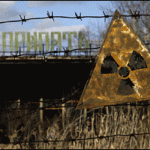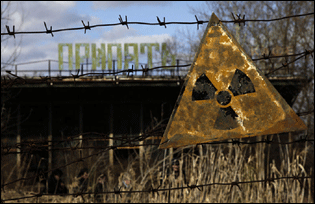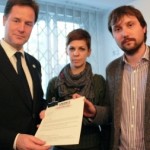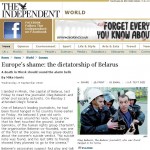
Originally published by anti-totalitarian journal Dissent Magazine on 31 May 2011
WHEN THE reactor at Unit 4 of the V. I. Lenin Atomic Power Station, Chernobyl, exploded twenty-five years ago, the people of Belarus were sacrificed by a secretive political system. Pilots such as Major Aleksei Grushin were sent into the air above Belarus to seed clouds with silver iodine so they would rain down what had spewed from the inner core of the reactor onto the fields below. That political decision kept Muscovites safe—but as a result, 60 percent of the disaster’s radiation fell on the hapless people of Belarus.
It was a national catastrophe. As author Svetlana Alexievich points out in her masterful Voices from Chernobyl, the Nazis took three years to destroy 619 Belarusian villages during the Second World War; Chernobyl made 485 villages uninhabitable in hours. Today, 2,000,000 Belarussians, including 800,000 children, live in contaminated areas. To give an idea as to how contaminated this land is, 100,000 people live on land with a radiation level 1,480 times greater than the level typically found on a nuclear bomb test site. Between 1990 and 2000, the incidence of thyroid cancer in adolescents in the region increased by 1,600 percent.
To begin with, the Soviet Union said almost nothing to its people about the catastrophe. But after the contamination spread across the Iron Curtain to Sweden, setting off radiation level alarms, there was an admission of an accident. Even so, stories in Pravda Ukrainy and Sovetskaya Belorussia parroted the official party line that Western propaganda was making the accident out to be worse than the “contained” incident it supposedly was. The long-term effects were said to be a few hundred additional cancer deaths over a generation. Farmers were told that afflicted land could soon be returned to productive use (a statement backed by the director general of the International Atomic Energy Agency [IAEA] in Vienna, a certain Hans Blix).
After the collapse of the Soviet Union, little changed in Belarus: one authoritarian regime was replaced by another. The country’s dictator since 1996, Alexander Lukashenko, a former collective-farm boss, is keen to get people back onto the land. He has personally intervened to support studies that show this land is safe to bring back into agricultural use. In 2004 he declared that it was time to build new homes and villages in the contaminated regions, stating triumphantly, “land should work for the country.”
Many international organizations, including the IAEA, backed Lukashenko’s aspirations. But Belarus isn’t a place to question the wisdom of the authorities. It is one of the least free places on earth, ranked below Zimbabwe and Iran for press freedom. And so the Soviet silencing of dissent continues.
A scientific expert on the effects of Chernobyl, Yuri Bandazhevsky, openly criticized the policy of bringing contaminated land into use a decade ago, suggesting that the government was knowingly exporting radioactive food. For this he was jailed on anti-terror charges. In 2001, he was sentenced to eight years in prison on “corruption charges.” He was released in 2005 and now lives in exile in France, unable to research the disaster’s effects on the people remaining in the evacuation zone.
Lukashenko is unfazed by such criticism. Since his reelection in December (deemed “unfair” by the Organization for Security and Co-operation in Europe’s election observers) he has ruthlessly clamped down on any opposition to his rule. Over 600 arrests were made in the days that followed the election result. Seven of the nine opposition presidential candidates were jailed, five of whom have now been sentenced to multi-year prison terms. The bombing of the Minsk metro on April 11, in which twelve civilians died, has been blamed by Lukashenko on his rule being overly liberal. He told his crony Parliament, “There was so much democracy, it was just nauseating.” As in Soviet times, fear stalks the country: mysterious terrorist acts, the near-total jailing of the opposition, KGB arrests in the dead of night, and allegations of torture abound.
In the absence of open politics, the remembrance of Chernobyl’s victims has become an intensely political act. Protests demanding justice for the victims until recently have been led by the opposition. In 2006, 5,000 protesters shouted anti-government chants declaring a cover-up on the twentieth anniversary of the Chernobyl catastrophe. Alexander Milinkevich, the main opposition leader, led the crowds.
For those living in the affected areas, political fear is compounded by a vacuum of information about the disaster. Detailed maps of the land contaminated in the Ukraine are readily available; not so in Belarus. The vacuum is filled with hysteria and fear. According to Richard Wilson, professor of physics at Harvard University, “The truth is that the fear of Chernobyl has done much more damage than Chernobyl itself.” To this day this fear infects daily life. A fear of deformities means there are more abortions than live child births in Belarus. One psychiatrist, Dr. Havenaar, studied the people of Gomel, one of the worst-affected areas. He found that local people said they were five times as sick as people in similar towns not affected by Chernobyl’s radiation. But after physical examinations, the level of illness among those towns was broadly similar. It was the psychological distress in Gomel that was far, far greater. Fear is literally making people sick.
Political decisions in Moscow made Belarus the dumping ground for over 100 times the radiation released by the atom bomb on Hiroshima. Now the aftermath of Chernobyl itself is intensely political. Prior to its post-election suppression, the opposition demanded answers from a secretive regime about the health effects of the disaster. Now Lukashenko is committed to building a new nuclear power plant bordering Lithuania (to the horror of Lithuanians)—on one of the country’s tiny patches of uncontaminated land—and to opening up the contaminated land for human inhabitation. Last month, Lukashenko visited the village of Dernovichi in the evacuation zone and delivered a speech on the anniversary of the Chernobyl disaster. His intentions for the area were quite clear:
In Narovlya district milk is produced which is used for the production of children’s food. The re-specialization of agriculture gives farmers work again. In the Gomel Region—there are 34,000 hectares from which it is possible to receive clean products. Besides, tourists are ready to come to this zone.
As for Major Aleksei Grushin, he was awarded a medal by Vladimir Putin at a state ceremony. This is a state secret in Belarus. In countries where dissenters are silenced, disasters like Chernobyl are magnified. The tragedy is twenty-five years on, and Belarusians are no more free.




